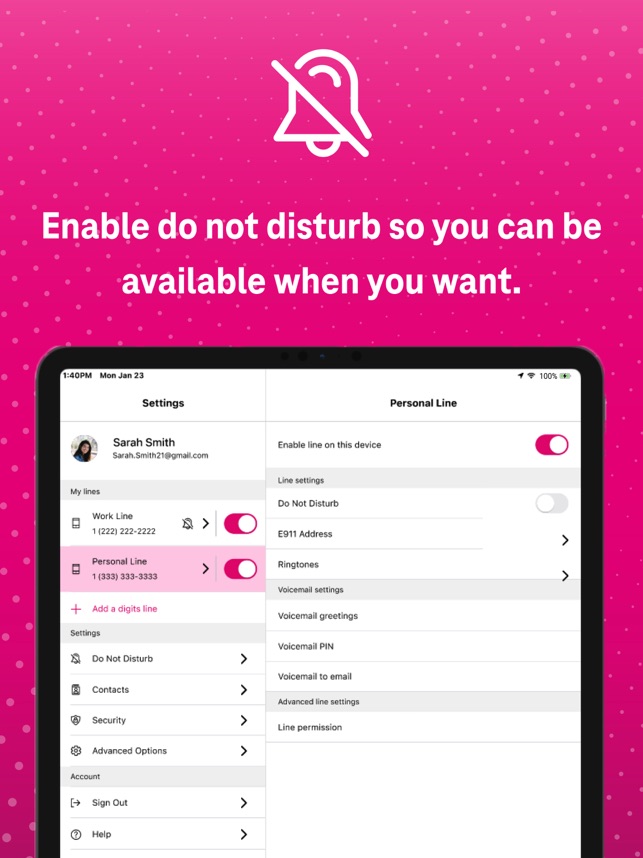T-Mobile Digits, a feature allowing users to receive calls and texts on multiple devices with a single phone number, has become a popular convenience. However, whispers of “T-Mobile Digits spying” have begun to circulate, raising concerns about user privacy. This article delves into the heart of this debate, exploring the functionalities of Digits, potential privacy risks, and steps to safeguard your information.
Demystifying T-Mobile Digits: A Boon for Connectivity
T-Mobile Digits simplifies communication by allowing users to connect their primary phone number to compatible tablets, laptops, and even smartwatches. This eliminates the need to carry multiple devices or juggle SIM cards. Imagine seamlessly receiving calls and texts on your work laptop while leaving your phone at your desk. Digits offers this flexibility, promoting a more connected lifestyle.
The app also boasts features like call forwarding, voicemail transcription, and the ability to send multimedia messages. For those juggling busy schedules, Digits can be a productivity powerhouse, keeping you reachable across various platforms.
However, convenience often comes with a caveat. Let’s delve into the potential privacy concerns surrounding T-Mobile Digits spying.

Unveiling the Gray Areas: Where T-Mobile Digits Spying Concerns Arise
While T-Mobile assures users that Digits doesn’t access personal data like photos or browsing history, the very nature of the app raises questions. Here’s a breakdown of potential privacy concerns:
- Access to Calls and Texts:Digits, by design, grants access to your calls and texts. While the intended purpose is to mirror your primary device, the concern lies in who else might have access to this information.
- Authorized Users:Account holders can add authorized users to their T-Mobile plan. These users could potentially access calls and texts made through Digits on linked devices. It’s crucial to understand who has authorized user privileges and to be mindful of granting such access.
- Data Security:Like any app, Digits transmits data. While T-Mobile implements security measures, data breaches are a constant threat. Understanding T-Mobile’s data security practices and how they protect user information is essential.
Mitigating the Risks: Safeguarding Your Privacy with T-Mobile Digits
Despite potential concerns, T-Mobile Digits can be a valuable tool if used responsibly. Here are some steps to maximize your privacy while using Digits:
- Limit Authorized Users:Be cautious when granting authorized user privileges. Only add individuals you completely trust with access to your calls and texts.
- Review App Permissions:During installation, be mindful of the permissions Digits requests. Only grant access necessary for basic functionality.
- Enable Two-factor Authentication:This adds an extra layer of security by requiring a code, in addition to your password, to log in to your T-Mobile account and potentially access Digits settings.
- Monitor Your Account:Regularly review your authorized user list and keep an eye out for any suspicious activity on your T-Mobile account.
Beyond Digits: A Broader Look at Mobile Privacy
The discussion surrounding T-Mobile Digits spying highlights a larger issue – mobile privacy. Our smartphones hold a wealth of personal information. Here are some general tips to strengthen your mobile privacy:
- Be Mindful of App Permissions:Scrutinize permissions requested by apps before installation.
- Update Regularly:Software updates often include security patches. Keeping your phone and apps updated is crucial.
- Utilize Strong Passwords:Avoid easily guessable passwords and consider using a password manager.
- Beware of Public Wi-Fi:Avoid sensitive transactions or accessing personal information on unsecured networks.
The Future of T-Mobile Digits: Transparency and User Choice
T-Mobile has a responsibility to be transparent about data collection and security practices related to Digits. Users deserve clear information about how their data is used and protected.
Furthermore, offering granular controls within Digits would empower users to choose what information they share through the app. This could include the ability to disable access to specific features like call forwarding or message history on linked devices.
Conclusion: A Balancing Act
T-Mobile Digits offers undeniable convenience. However, user privacy remains paramount. By understanding potential risks, implementing safeguards, and advocating for greater transparency, we can navigate this digital landscape with a healthy balance of convenience and security. The future of T-Mobile Digits hinges on building trust by prioritizing user privacy and empowering individuals with control over their information.
The Role of Regulations and Independent Scrutiny
The conversation surrounding T-Mobile Digits spying underscores the need for robust data privacy regulations. Laws like the California Consumer Privacy Act (CCPA) and the General Data Protection Regulation (GDPR) in Europe grant users rights to access, delete, and opt-out of the sale of their personal information. Stronger regulations can incentivize companies like T-Mobile to prioritize data security and user privacy by design.
Independent audits by reputable cybersecurity firms can also play a vital role. Regular assessments of T-Mobile’s data security practices would provide valuable insights and foster trust with users.
What Does the Future Hold for T-Mobile Digits?
As technology evolves, so will T-Mobile Digits. The future could see features like end-to-end encryption for calls and texts conducted through Digits, further bolstering user privacy. The ability to remotely wipe data from linked devices in case of loss or theft could also be a valuable addition.
Ultimately, the success of T-Mobile Digits hinges on building trust with users. Transparency, robust security practices, and user control over their information are key ingredients for a future where convenience and privacy coexist.
Sources:
- can the primary account holder view text messages t-mobile
- T-Mobile Digits Support Page.
- T-Mobile Privacy Policy.
- Electronic Frontier Foundation: A Guide to the California Consumer Privacy Act (CCPA).
- European Commission: General Data Protection Regulation (GDPR).
Additional Resources:
- National Institute of Standards and Technology (NIST) Cybersecurity Framework.
- The Privacy Rights Clearinghouse.
Disclaimer: This article is for informational purposes only and does not constitute legal advice.
By including these additional sources, users can delve deeper into the topics discussed and make informed decisions about their privacy and the use of T-Mobile Digits. This empowers users to leverage the app’s convenience while remaining vigilant about safeguarding their information.


